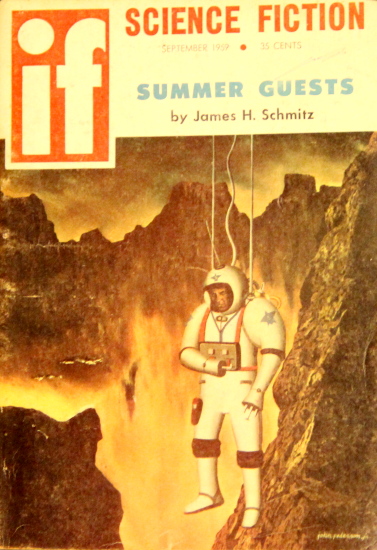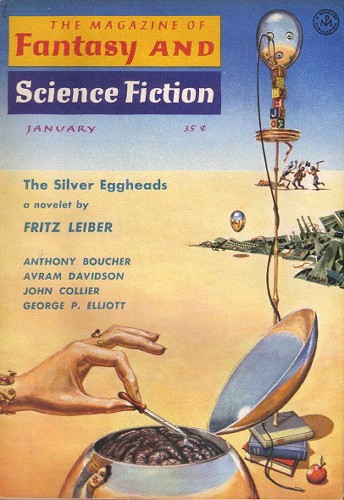September is almost over, and it’s not even the end of August.
Confused? It’s standard practice to date magazines with the month that they are to be taken off the shelves. Thus, I got all of my September 1959 issues in late June. I also got my October Galaxy around then, too, but that’s because it’s a bi-monthly.

The September 1959 IF, now essentially Galaxy Jr., is the last September issue to review before moving on to the next month, and so far so good!
As with the last ish, the magazine opens strongly with a novelette by James H. Schmitz called Summer Guests. At first, it seems like a bit of wish-fulfilment: bored, lonely working stiff encounters a pair of lovely fairies while at his summer retreat. Very quickly, our protagonist learns that his guests are far more than they seem, and he finds himself an unwitting pawn in a struggle between races and dimensions. It’s got a wicked sting in the tail, too. Solid, 4-star tale.
On to number two. Philip K. Dick never turns in a bad effort, but Fair Game is one of his lesser works. A professor is hounded by extra-dimensional creatures who appear to be after his fine intellect. In tone, it sounds a bit like a much better Dick story I read in Beyond many years ago (I can’t remember the title), but the ending is rather pat. 3 stars.
Margaret St. Clair (often known as Idris Seabright) has an entry in this month’s issue: The Scarlet Hexapod. In short, if you like dogs, you’ll love the six-footed Martian version. It’s all about how Jeff, the extraterrestrial Fido, risks all to save its owner from a murderous plot. I found the story insubstantial, but not trying. 3 stars.
Finally, for today, we have Charles L. Fontenay’s Bargain Basement in which a pair of modern-day fellows frequent a little general store that is, literally, a slice of the future. No one minds getting whiz-bang merchandise for cheap, but the pleasant situation collapses in a bit of paradox when one of the protagonists uses a love drug to steal the fiancée of the other (in a bit I found disturbing). The subsequent change in history causes the future store to disappear… yet nothing else changes, including the marital status of the woman and her scoundrel new husband. 3 stars reduced to 2 for the poor treatment of the female character.
That leaves us at exactly 3 stars for the first half of the issue. We’re doing better than this month’s Astounding, but will the luck hold out into Part 2?
(Confused? Click here for an explanation as to what's really going on)
P.S. Galactic Journey is now a proud member of a constellation of interesting columns. While you're waiting for me to publish my next article, why not give one of them a read!
This entry was originally posted at Dreamwidth, where it has comments. Please comment here or there.



